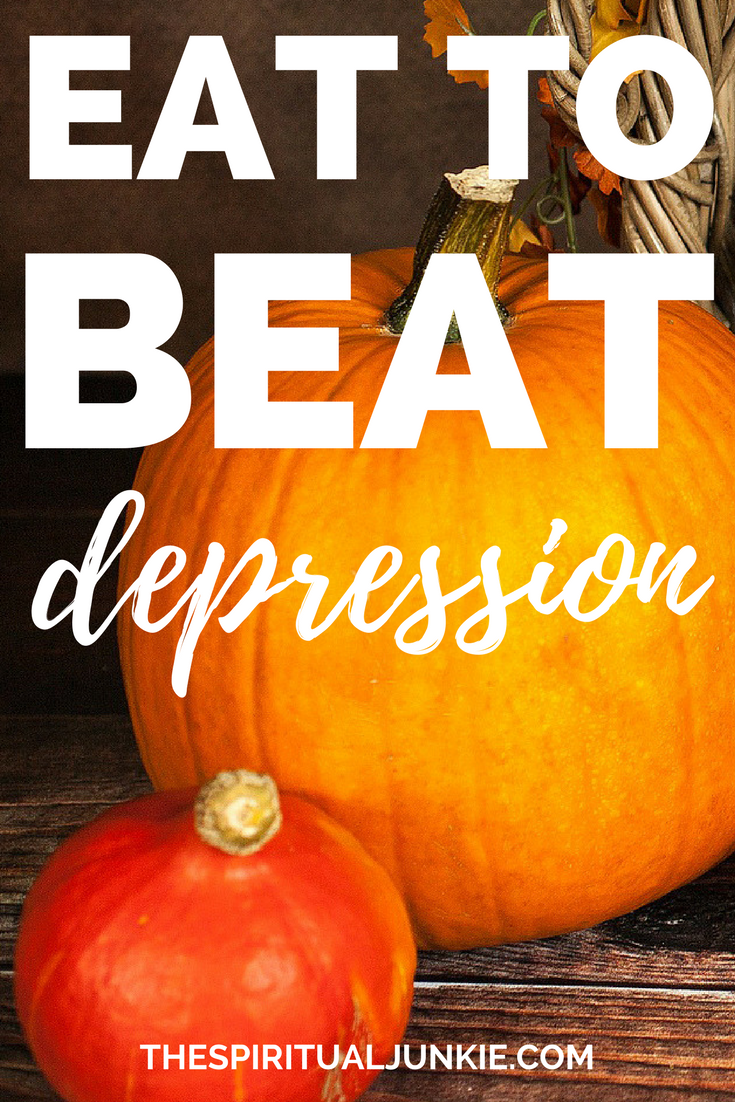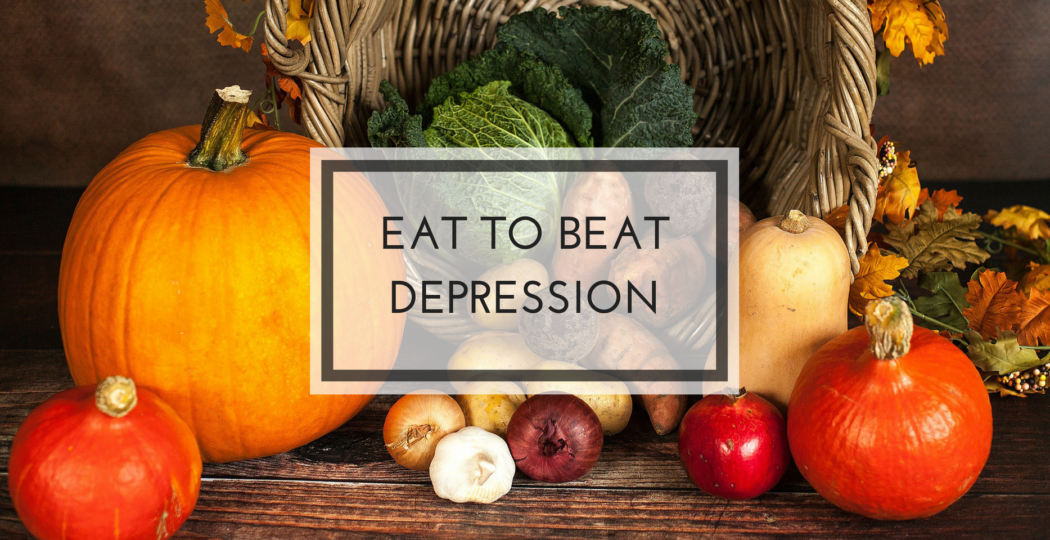Did you know that what we eat can have a huge impact on our mood?

I’ve read that diet is unlikely to be the sole cause of depression, but it is believed that deficiencies of vitamins, minerals, amino acids and fatty acids can certainly play a part.
So, how can we change our diet to boost our emotional wellbeing?
A great place to start is a super little booklet published by The Mental Health Foundation for anyone who wishes to protect their mental health through healthy eating. It is particularly relevant for people recovering from mild or moderate depression and suggests how changes to the diet can help improve mood. Download ‘Healthy Eating and Depression: How diet may help protect your mental health’ as a free PDF document here.
[icon name=”hand-o-down” class=”” unprefixed_class=””] The Happy Hormones: Serotonin, Dopamine & Endorphins [icon name=”hand-o-down” class=”” unprefixed_class=””]
Serotonin
“Serotonin is a brain chemical believed to promote calmness and ease depression. Foods themselves don’t contain serotonin but what you eat may be able to tip the balance in favour of increased serotonin production in the brain.” – Daily Mail
Dopamine
“Low dopamine levels can lead to lack of motivation, fatigue, addictive behavior, mood swings and memory loss… The dopamine consumed in food doesn’t cross the blood–brain barrier and so has no impact on your brain… Dopamine is made from the amino acid l-tyrosine which is commonly found in protein-rich foods. Eating a diet high in l-tyrosine can help ensure you’ve got the basic building blocks needed for dopamine synthesis.” – Be Brain Fit
Endorphins
“When you exercise, your body releases chemicals called endorphins. These endorphins interact with the receptors in your brain that reduce your perception of pain. Endorphins also trigger a positive feeling in the body, similar to that of morphine. For example, the feeling that follows a run or workout is often described as “euphoric.” That feeling, known as a “runner’s high,” can be accompanied by a positive and energizing outlook on life.” – WedMD
“Although no food products contain whole endorphins for easy consumption, several endorphin-stimulating foods boast high levels of the vitamins and minerals that play a large part in boosting your brain’s production like vitamin B12, vitamin C, zinc, potassium, and iron.” – Popsugar
[icon name=”hand-o-down” class=”” unprefixed_class=””] Foods to Include [icon name=”hand-o-down” class=”” unprefixed_class=””]
-
Brazil Nuts – “Studies have linked depression with low levels of the mineral selenium. The recommended daily amount is 0.075mg for men, and 0.06mg for women… The easiest way to dose-up is to grab a handful of nuts. Brazil nuts are a super selenium source, with 0.02mg – that’s a third of a woman’s RDA – in each little nut.” – Independent
-
Papaya – “Papaya can quickly lift you or a loved one out of grouchiness. Keep it on hand to share when feelings of crankiness, crabbiness, or impatience creep in. Papaya breathes light into everyone who consumes it, casting out negativity and darkness, purging old judgment, resentment, and stored-up frustration.” – Life Changing Foods by Anthony William
(By the way, this is one of my FAVOURITE cook books and his book Medical Medium is an absolute MUST-read!)
-
Bananas – Bananas provide tryptophan and vitamin B6 – nutrients that can help your body to fight the symptoms of depression. Tryptophan is an amino acid which is the only normal dietary raw material for serotonin synthesis in the brain. Vitamin B6 is needed by your body in order to manufacture serotonin from tryptophan.
-
Sweet Potatoes – Sweet potatoes are also high in vitamin B6. Plus, they are “…loaded with beta-carotene, a fat-soluble, brain-protecting antioxidant the body uses to manufacture vitamin A. This vitamin promotes the enzymes that create mood-regulating neurotransmitters like dopamine.” – Rodale’s Organic Life
-
Chillies & Ginger – Capsaicin (which is found in chillies, cayenne pepper and fresh ginger root) stimulates the production of endorphins.
-
Blueberries – Blueberries have the highest antioxidant content of all fruits and are also rich in vitamin C. These nutrients regulate cortisol levels and lower blood pressure, thus reducing stress levels and anxiety. Consistently high stress levels have been shown to play a major role in depression. Antioxidants also help to prevent and repair oxidation damage and inflammation at a cellular level. This is important since research shows a clear link between chronic inflammation and depression.
-
Apples – Like blueberries, apples are also high in antioxidants. They are also full of soluble fiber, which balances blood sugar and helps prevent mood swings.
-
Raw Sauerkraut – Raw Sauerkraut is a probiotic-rich fermented food. Probiotics are often described as ‘friendly’ bacteria and they help to restore the natural balance of bacteria in your gut. Why is this important? Because research has shown that the health of your intestinal flora impacts your production of neurotransmitters. An overabundance of bad bacteria leaves toxic byproducts which destroy the brain cells that make dopamine. Plus, it is the nerve cells in our gut that manufacture 80 to 90 percent of our body’s serotonin, making our intestinal health even more important.
-
Okra – “This often-overlooked vegetable is a treasure trove of neuroprotective, antidepressant compounds. Full of soluble as well as insoluble fiber, okra feeds “good” gut bacteria, which researchers increasingly believe influence mood, motivation, higher cognitive functions, and overall brain health. A 2011 study also suggested gut microbiotics could alleviate stress-related disorders.” – Delicious Living
-
Walnuts – “Walnuts are one of the richest plant sources of omega-3 fatty acids, and numerous studies have demonstrated how omega-3 fatty acids support brain function and reduce depression symptoms. A study published in the British Journal of Psychiatry is especially interesting. The lead authors ask the question, “Why is the vast part biological research — from genetics to psychopharmacology — concentrated on neurotransmitters, when the mammalian brain is approximately 80 percent fat (lipids), and there is a growing body of research demonstrating the critical role of lipids in brain functioning?”” – Everyday Health
“The Mental Health Foundation recommends walnuts for their omega 3 oils, powerful mood boosters that increase serotonin levels. They also contain folic acid, which is similarly beneficial, and zinc, which is a brilliant defence against stress.” – Telegraph
(Flaxseeds, hemp seeds, and chia seeds are also rich in omega-3 fatty acids. You can read more about omega-3 fatty acids in my blog post Essential Fatty Acids. Plus, flaxseed’s natural phytoestrogens have also been shown to reverse depressive behaviour.)
-
Avocado – The humble avocado is a depression-fighting superfood. It contains more folate per ounce than any other fruit, along with omega-3 fatty acids AND tryptophan. Folic acid can prevent excess homocysteine formation, which is important since homocysteine restricts the production of serotonin and dopamine.
-
Tomatoes – Tomatoes also contain folic acid, as well as alpha-lipoic acid which helps to improve insulin sensitivity and lower blood sugar levels, which stabilizes the mood. “Japanese researchers showed that eating tomato products two to six times a week cut the risk of depression in the elderly by 46 percent compared with those who ate them less than once a week. Those who ate tomatoes daily reduced depression risk by 52 percent. Other fruit and vegetables did not show the same effect.” – Best Health
-
Complex Carbohydrates – “There is considerable evidence that carbohydrates raise plasma levels of serotonin and are likely to increase serotonin in the brain. The problem with eating excessive simple carbs is that it is a poor long-term health strategy and only provides short-term serotonin increases. Consume complex carbohydrates for a more sustained release of serotonin without causing a drastic insulin spike.” – Mental Health Daily
-
Fava Beans – Fava beans, also called broad beans, are one of the few foods that contain the amino acid l-dopa, a direct precursor to dopamine.
-
Mushrooms – Mushrooms contain beta-glucans, a form of soluble dietary fiber, which improve blood sugar and insulin regulation, thus helping to prevent mood swings. They also help to promote healthy gut bacteria, and we’ve already learnt how important that is for fighting depression!
-
Kale – Kale provides alpha-linolenic acid (ALA) – an omega-3 fatty acid – along with anti-inflammatory vitamin K.
(Incidentally, dark leafy greens (like kale and spinach) are the first of the G-BOMBS (greens, beans, onions, mushrooms, berries, seeds) that Dr. Joel Fuhrman describes in his book The End of Dieting. These are the foods with the most powerful immune-boosting and anticancer effects.)













